How menstrual stigma is driving out girls in schools
- In West Nile region, the school completion rate among girls at the primary level is low, at about 35 to 38%
- This has led the high school dropout rate due to menstrual stigma among the girl child, early teenage pregnancy, peer pressure, lack of support, among other factors.
- According to the statistics from the district education department, the primary school completion rate has increased from 28.1% in 2022 to 41.8% in 2024.
By Matata Benzamin
For Gloria Limio (not real name coz she is a teenage), future has been darkened with the continuous menstrual stigma she faced during every cycle.
She faced abuse from her fellow pupils especially when she has menstruation that spoils her school uniform. This lowers her esteem and dashes home to wash and change clothes at home. She doesn’t return to the school that same day.
The school youth-friendly corner does not provide sufficient privacy for the girls. As a result of menstrual stigma, she nearly dropped out of school.
But her hope has been restored with the efforts by partners who are now helping schools to provide them with pads.
We used to fear visiting health facilities, but with the help of peer educators and health workers, we now feel confident to ask questions about menstrual hygiene, family planning, and SRHR
She added: “The youth-friendly corner is small and hidden. It should be relocated to a more open and accessible place.”
Efforts
In a joint effort to promote menstrual hygiene and reduce stigma and school absenteeism among adolescent girls, Partners comprising the United Nations Population Fund – UNFPA, Diamond Trust Bank, and its implementing partners, Naguru Teenage Centre and CARE, have distributed reusable sanitary pads to pupils at Lefori Primary School in Moyo District.
The program under the theme; Achieve More Girls, is part of the Danish Embassy-funded under SAY Programme, which focuses on sexual and reproductive health and rights (SRHR) and gender-based violence (GBV) awareness.
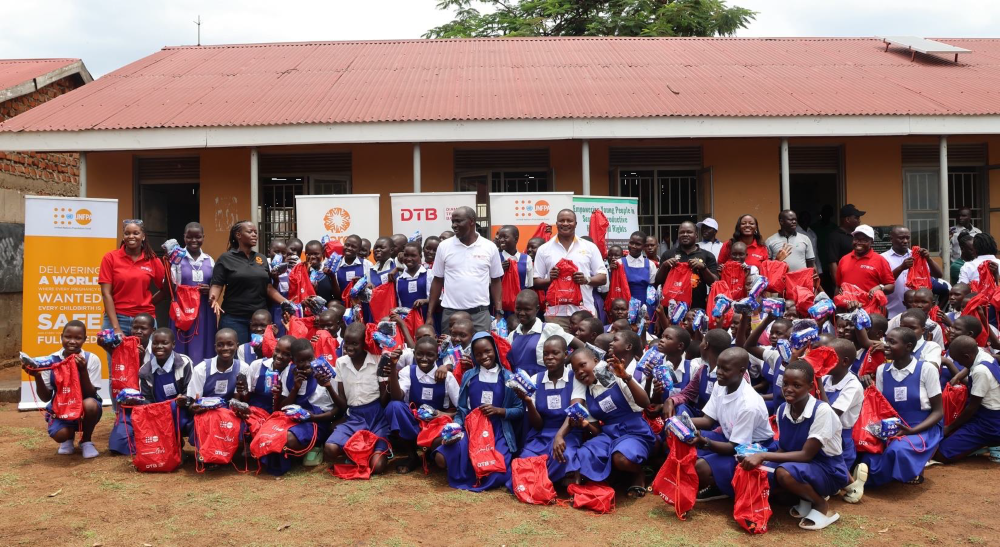
Hope: Naguru Teenage Centre and CARE staff after empowering and supporting adolescent girls with sanitary pads at Lefori primary school, Moyo district. All images by Matata Benzamin.
During the distribution event, Jesca Ongiertho, the Chief Administrative Officer of Moyo District, said this collaboration helps end teenage, related challenges faced by the girls in primary schools.
“Teenage pregnancy and girl-child education are still major challenges. The education completion rate for the girl child is still low. Providing sanitary pads will greatly contribute to reducing school drop-out rates and improving school completion.”
Mali Michael, the District Education Officer for Moyo, emphasized that: “Some of the adolescents are in primary schools. We need to empower teachers and health clubs which are very helpful for them. The sanitary pads have improved school completion among girls.”
Beyond pads distribution
The Assistant District Health Officer in charge of maternal and child health, Dr Michael Adrawa, suggested expanding the initiative to support more girls.
We need a comprehensive package of menstrual hygiene education beyond just pad distribution and more engagement of parents. I also recommend conducting a mini-study to assess the program’s impact
The Head of Sales and Marketing at Diamond Trust Bank, Samuel Matekha, reaffirmed the bank’s commitment to empowering girls and women.
“We believe in supporting humanity and consider the girl child essential for the future. 56% of our staff are women. The kits also include menstrual hygiene booklets and safety bags,” Matekha said.
The UNFPA Programme Coordinator in Arua, Alex Chono, said: “UNFPA provides resources to implement SRHR, SGBV awareness, menstrual hygiene, and more. Our partnership with DTB is focused on reducing school dropouts. We aim to support 56 schools and 12 health facilities in Moyo district.”
The deputy head teacher of Lefori Primary School, Megwera Asunta, acknowledged the impact of the initiative.
“Your support has revitalized our school’s health and sanitation clubs and helped disseminate knowledge on menstrual hygiene. However, we still face challenges such as limited water access, lack of safe rooms for girls, and insufficient parental involvement.”
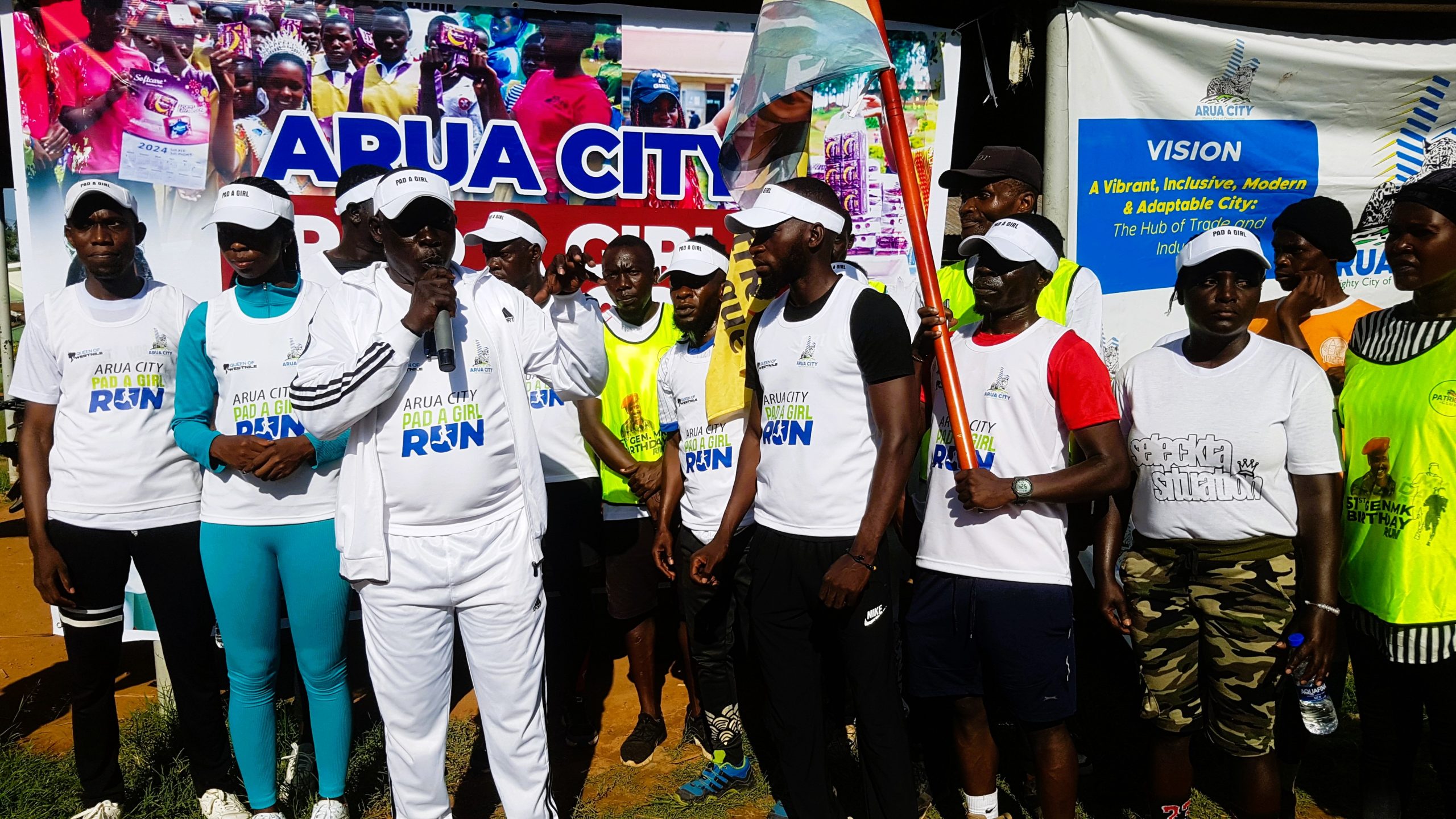
For the same cause: MP Arua Central Division, Hon. Atima Lee Jackson, speaking during Pad a Girl Run 2025.
Teenage pregnancies
Charles Angupi, the health In-Charge of Lefori Health Centre III, noted that teenage pregnancy has been at its peak in the sub county. He cited challenges of resources, ignorance and capacity building to provide conducive learning environment.
“Lefori sub-county previously led in teenage pregnancy, but the SAY Programme has helped reduce this by creating youth-friendly corners,” he said.
“Health workers have been trained to provide adolescent services and conduct school health outreaches, including training girls to make reusable sanitary pads,” he added.
“Our challenges include limited space for youth-friendly corners, lack of materials, and inadequate peer educators. We need to build a modern adolescent youth corner.”
This initiative equally expanded to Arua City where Miss West Nile 2024/2025 picked interest and organized “Pad a Girl Run” every year from 2023 up to date to support girls in primary schools.
Alobo Janet Patricia, the Miss West Nile 2024/2025, stated that: “The community should rise against the cultural myths of viewing menstruation as a sign of maturity for girls to get married at an early age.”
She calls upon the leaders to join hands to address the challenge and encourage communities to prioritize education.
Meanwhile, Maneno Mercy, the programs officer at Mentoring and Empowerment Program for Young Women – MEMPROW Arua office said, “The region lags behind due to limited access to menstrual materials and lack of empowerment for girls to make their own reusable pads, especially in rural areas. We should train these school-going girls to make their own menstrual materials to end stigma.”
Arua Central Division Member of Parliament, Mr Atima Lee Jackson, said that support towards the girl child is crucial to ensuring a better future.
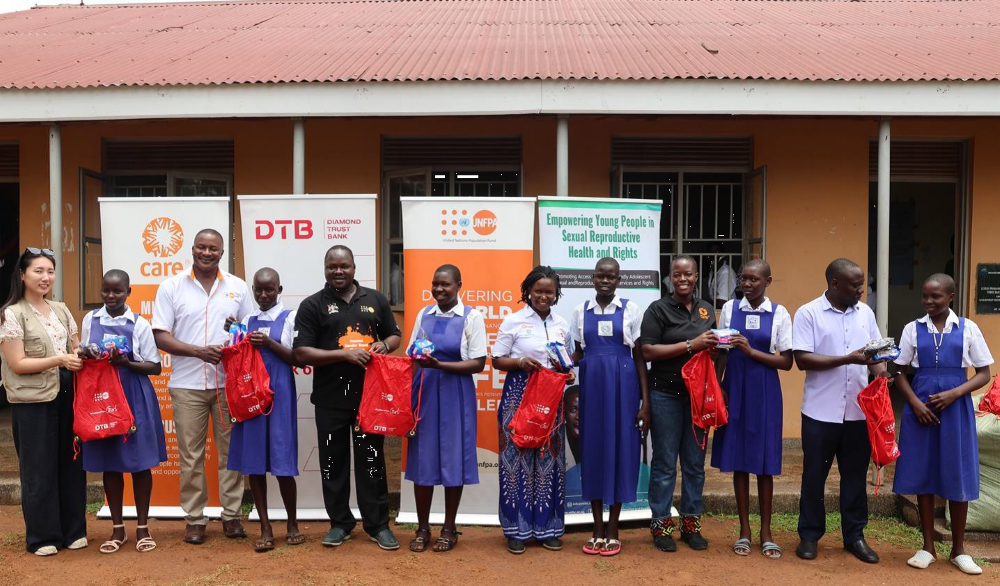





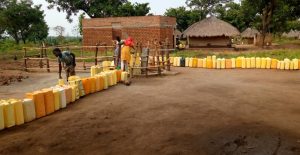






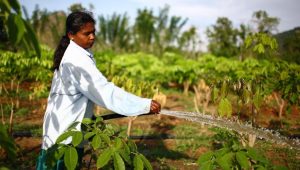
Post Comment